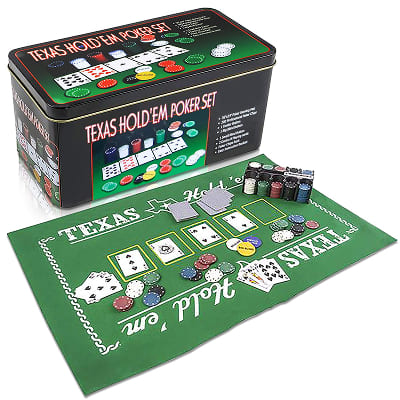
What’s This Game All About?
Texas Hold’em is a strategic, turn-based card game where players compete to build the best five-card hand — or outwit their opponents through timing and bluffing. While widely known through tournaments and TV, it’s just as powerful around a living room table. You don’t need chips, cash, or intimidating rules — just a deck of cards, basic hand rankings, and a group ready to engage.
The game’s strength lies in how much it reveals about players. Patience, boldness, intuition — all come into play as people bet, fold, and try to read each other across shared cards. And despite the deep strategy potential, it’s surprisingly easy to teach at a party, game night, or friendly gathering. Just 10–15 minutes of explanation and a couple of practice hands can get almost anyone rolling.
At the core, Texas Hold’em is about rhythm and decisions — when to play strong, when to step back, when to read the room. It’s not about gambling — it’s about reading patterns, managing pressure, and building the best moment to strike.
How to Play
- Set up the table. Use a standard deck of 52 cards. Seat 2–10 players in a circle. Assign two players as the “small blind” and “big blind” — these are rotating roles that ensure the action moves.
- Deal the hole cards. Each player gets two private cards (“hole cards”) dealt face-down. These are the cards they’ll use to build their final hand.
- Start the first betting round. Going clockwise from the big blind, each player decides whether to fold (quit), call (match the current bet), or raise (increase the bet). All players must match the highest bet to continue.
- Reveal the community cards. The dealer places cards in the center of the table in stages: the flop (3 cards), the turn (1 card), and the river (1 card). These are shared cards that all players can use with their hole cards to build the best 5-card hand.
- Continue betting after each reveal. A new round of betting follows each stage: after the flop, after the turn, and after the river. Players may fold, call, raise, or check (pass without betting, if no one has raised).
- Showdown — or win by fold. After the final bets, any remaining players reveal their hands. The best 5-card combination wins. If all others fold before the end, the last standing player wins — no need to show their hand.
Tip for casual play: Use chips, tokens, or point counters instead of real money. Keep blind amounts small and consistent. Rotate the dealer clockwise after each round.
Tips & Smart Variations
- Start with open hands (practice round). For first-time players, deal one full round where everyone keeps their cards face-up. It’s a safe, fast way to learn betting, hand strength, and flow without stress.
- Use low-stakes tokens or points. Instead of money, play with candies, buttons, or chips worth points. It keeps things competitive but friendly, especially for mixed ages or new players.
- Encourage table talk. Texas Hold’em gets more fun when players are allowed to chat, bluff, or mislead (lightly). Just remind the group to keep it respectful and good-humored.
- Rotate roles often. Make sure different players experience the small blind, big blind, and dealer positions — it builds comfort and helps everyone stay engaged.
- Try “short stack” mode. Give each player a small number of chips to start (e.g., 20 tokens). It speeds up rounds, limits overly conservative play, and keeps energy high.
- Keep a hand-ranking cheat sheet nearby. Especially for beginners, a quick reference showing hands from highest (Royal Flush) to lowest (High Card) can speed up play and reduce confusion.
Best For...
- Groups of 3 to 8 players looking for a slow-build, thoughtful game with bursts of excitement. Works especially well with 4–6 for more interaction and faster turns.
- Evening game nights where people want a game that rewards reading others, not just dice rolls or trivia knowledge.
- Mixed-experience groups — it’s easy to teach, but also has enough depth to keep repeat players invested.
- People who enjoy quiet tension and subtle strategy — less party energy, more mental poker-face energy.
- Events where competition is welcome, but casual — Texas Hold’em encourages bluffing and betting without real risk.
Want Help Hosting a Friendly Poker Night?
Whether you're teaching first-timers or building a fun poker vibe without the pressure, we’re here to support your game night goals. Get quick advice on setups, rules, or house variations — or browse other game ideas below.
